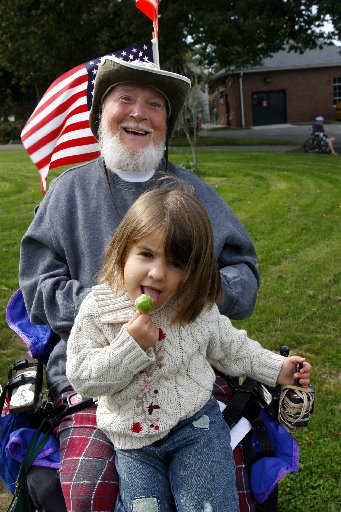CLICK HERE to read the full story of Frank.
Page one, Providence Journal, Monday, July 23, 2012
passages | Beazley was champion for disabled, lauded artist
by G. WAYNE MILLER
Journal Staff Writer
BURRILLVILLE - Frank Beazley, who survived a harsh childhood and a
devastating spinal-cord injury to become Rhode Island's foremost
advocate for people with disabilities - and also a celebrated artist and
poet - died Sunday morning at Zambarano Hospital, where he had lived
since 1967. He was 83.
Just this spring, in a rare honor, the
main patient building at Zambarano was named for him. Beazley, the
General Assembly declared, was "someone who has worked tirelessly to
ensure continuous quality of care for all patients, and who has been and
continues to be a tireless voice for the voiceless." Governor Chafee
signed the legislation into law.
Senators Paul W. Fogarty, D-Glocester, and Rep. Cale P. Keable, D-Burrillville, offered tributes to Beazley on Sunday.
"Frank
was a longtime friend and mentor to me and to many," Fogarty said. "He
made a tremendous difference in the quality of life of residents at
Zambarano and throughout the state, with his art and poetry, with his
advocacy, and especially with his infectious smile. … I was honored to
know him and to call him a friend."
Keable said: "As someone
whose brother was a resident at Zambarano for 13 years, I saw firsthand
the difference that Frank made in the lives of residents there. Frank
was an inspiration, to them and to me. … All Rhode Islanders can learn a
great deal from Frank's life."
Son of an unwed teenager whose
family did not acknowledge him, Beazley was born Dec. 13, 1928, in
Halifax, Nova Scotia. He was raised in an orphanage and, later, in a
foster home run by an abusive alcoholic.
After service in the
Royal Canadian Army, Beazley became a baker. He moved to Rhode Island in
1953 in search of a better life. He was returning to his Providence
home from his shift at a Dunkin' Donuts bakery Jan. 6, 1967, when he
fell down a flight of stairs.
The accident left him a
quadriplegic, permanently paralyzed from the neck down. After several
weeks at Rhode Island Hospital, he was moved to Zambarano, now a unit of
state-run Eleanor Slater Hospital. With rehabilitation, he was able to
regain some use of his hands.
Beazley's fiancée eventually
abandoned him, leaving him alone at the institution on remote Wallum
Lake, but Beazley did not let his circumstances defeat him. He began to
paint and write poems. He gained U.S. citizenship. He found his voice,
becoming president of Patients for Progress, a platform he used to
advocate for rights for the disabled.
At Zambarano, Beazley
successfully championed campaigns for greater patient freedoms,
including the right to wear regular clothes, pass fewer hours in bed,
watch cable TV and spend more time in the community - campaigns that
required years of dogged persistence.
Beazley fought moves to
close wards and stop RIPTA bus service to Zambarano. Statewide, he
fought for increased funding of programs for all people with
disabilities. He regularly testified at the State House, where governors
and legislators opened their doors to him. And he always spoke his
mind.
Beazley was honored many times for his art and poetry,
including twice winning the Allen Ginsberg Poetry Contest and being
featured in a display at the Second International "One Heart, One World
Exhibition 2002 Cultural Olympiad," in conjunction with the 2002 Salt
Lake City Olympics.
Beazley was the subject of a 12-part
Providence Journal series, "The Growing Season," published in 2006.
Hundreds of readers responded to his story of triumph against great
odds.
Behind his many achievements was a modest man of
endless good will, with blue eyes and a warm smile. He was fond of
flags, lapel pins, candy, children and what he called "beautiful days"
ones, for example, with soothing breezes and glorious sunsets.
Beazley lived a simple philosophy: "Take what's there for you. Enjoy what you can."
To
generations of doctors, nurses and other staff at Zambarano, Beazley
was a cheering presence always grateful for their care, which kept him
in good health for nearly a half century. To the many friends he made
through his advocacy and his art, Beazley was a man who listened and
provided encouragement in whatever challenges people faced.
In his private moments, he loved a good meal, music boxes and the New England Patriots.
Beazley's last public statements came in April, when he made what would
be his final visit to the State House, to be officially honored on the
occasion of the naming of the Frank Beazley Building, where he lived so
long and died.
"It's one of the greatest things that's ever
happened to me," said Beazley. "I hope it gives inspiration to a lot of
other people."
Typically, Beazley offered gentle advice to others facing adversity, of whatever kind.
"Well," he said, "it's the old saying: You just have to keep your chin up and fight your battles. And respect people."
Vigorous
in the spring, Beazley declined in recent weeks, though he could still
manage a smile. He died in his bed on his long-time ward, 2 North.
Funeral arrangements are incomplete.








